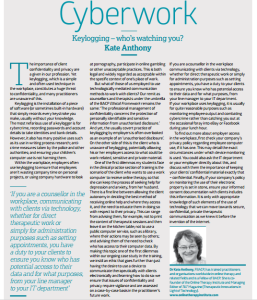During one of my infrequent bouts of insomnia last night, it occurred to me that in 2015 we ought to be celebrating the 20th birthday of online counselling and therapy. It now also occurs to me that thinking about such things at 3am is a bit odd, but then those who know me know that the practice and ethics of online work is the thing that keeps me awake at night, so I’ll choose the word passionate rather than odd…
Anyway, as outlined in my 2010 book Online Therapy: A Practical Guide, co-authored with the lovely DeeAnna Nagel (now of Havana Wellness – check it out!), it’s established that the first paid-for online mental health services started appearing in mid-1995, led by pioneers such as Leonard Holmes, John Suler, David Sommers and of course, John Grohol of PsychCentral. There’s a timeline here up to 2002 from the old Metanoia.org site, one of the first websites I came across when starting to look into the emerging field in 1998.
20 years old in 2015 – that means the field is almost an adult! So I am constantly surprised when it is referred to as “new” – it may be young and dashing, but at 20 years old, it’s not exactly new anymore!
In fact, it also now occurs to me that my training programmes first emerged in a face-to-face capacity in 2000, so the sub-field of training for online services is already a teenager (read my recent BJGC paper about that here)! And let’s not forget Supervision and Coaching also taking place online!
So I was pleased to be invited to Switzerland next year to speak at a conference being offered by the University of Basel. The conference theme is “Typing Yourself Healthy…”, and I was reflecting how nice it is to see the original online therapy modality being aired – a part of online therapy which remains robust despite the great technological developments we have seen over the years, particularly with video now being a reliable method of communication with clients (this wasn’t the case back in 1995, trust me!). Even if you picture “online therapy” as “video therapy”, I’m pretty sure that there is a lot of text-based work involved. And if you have joined the excellent free-to-sign-up platform PlusGuidance, you’ll know that text-based work is very much a part of the communication tools you can use with clients.
So, apart from making me feel very old, what can we take from the history of online therapy? Our 20-year old is maturing, no doubt – BACP will shortly publish new Good Practice Guidance for working with both text and audio/video – the latest set of ethical advice from a professional organisation that first looked at the area back in the late 90’s, and first published guidelines in 2001. The number of doctoral-level studies in the field has increased since my own was awarded back in 2010, and I see many on the horizon as trainees with the Online Therapy Institute find their own burning research topics as a result of their studies. The media is less shocked by the concept of using the World Wide Web for mental health support, although they still love a story about it going pear-shaped (and always will, I suspect). Even using avatars and virtual environments for therapy doesn’t raise too many eyebrows these days.
So join me in lighting a candle for the 20th anniversary of online practice going live! It’s been a thrilling (and sometimes frustrating) journey to adulthood, as the Internet became an everyday part of our lives and more and more clients reached out through their personal devices rather than calling their medical practice. Having an online element to your practice shouldn’t be intimidating – the pioneers of the field have had your back for ages – so maybe it’s time to reach back out to the clients who are trying to find you online!




